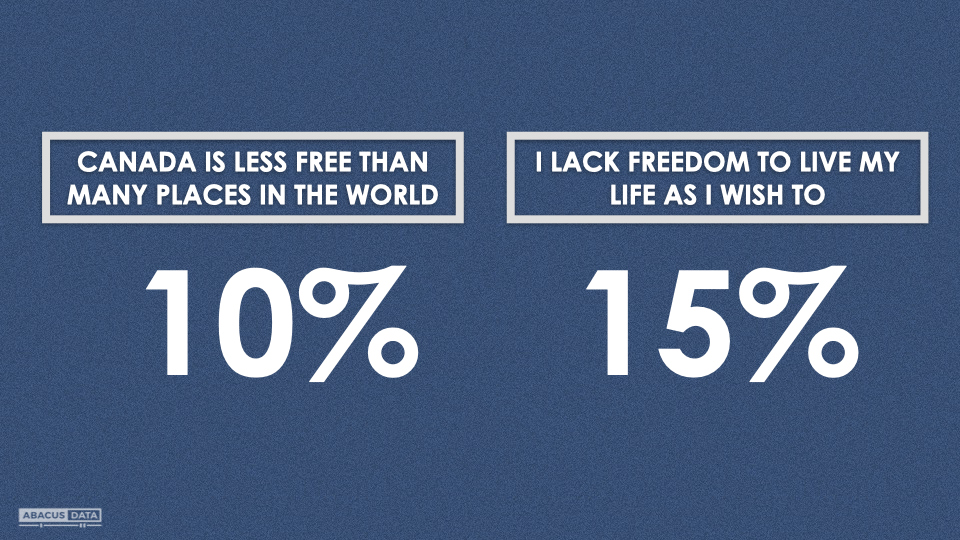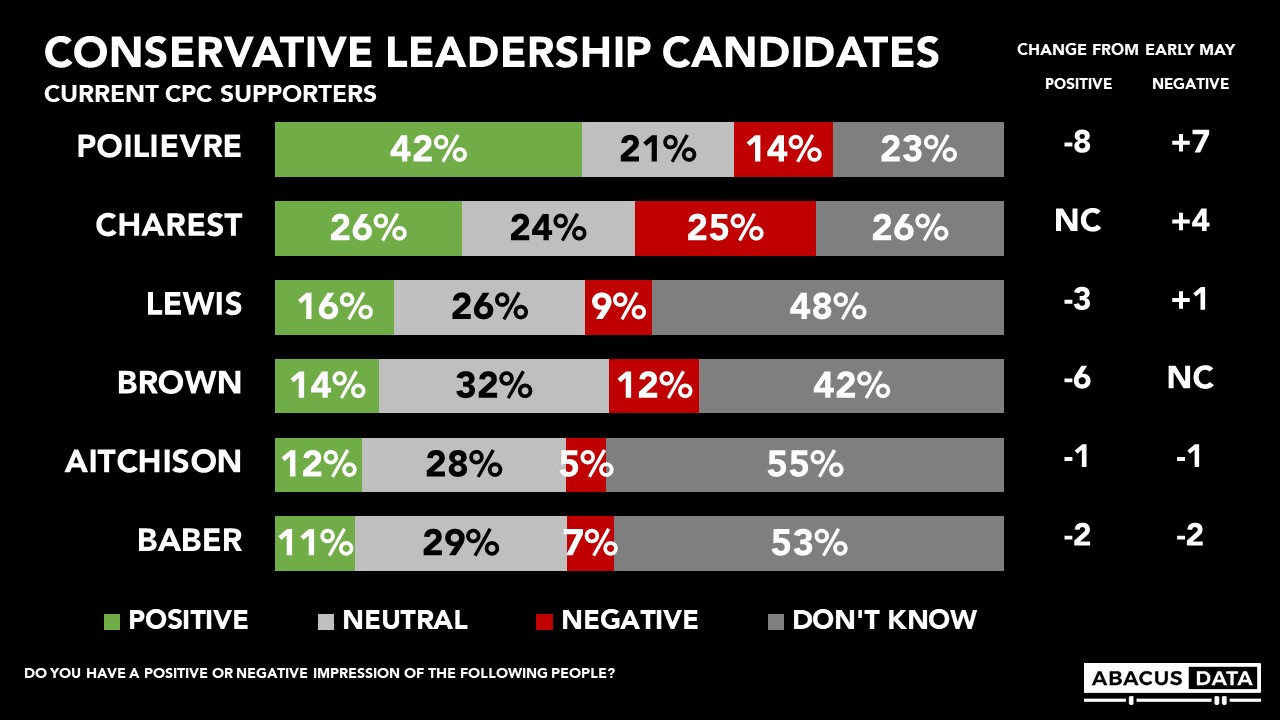Tired of hyper confident predictions? Here’s something different.
September 20, 2021
In case you feel you’ve had enough supremely confident predictions about what will happen in today’s election, rest easy, this won’t add to that total.
Who turns out to vote in this unusual circumstance is not complete guesswork – our data and that of other firms are somewhat helpful, but there’s enough softness in that science to make it uncertain which party will be in the best position to form a government when the counting is done.
So, without knowing how it will all net out, for what it’s worth, here are the things which have captured my attention in this election.
After a number of years in government, any group of incumbents tends to produce messages that are self-congratulatory, windy, and laden with 50 cent words. The Liberals have been no exception in this area, and some of the language they have used in recent years to promote their ideas has done more to push voters away than drawing them in. Whether they win or lose, this election should be a reminder to talk like people talk, not talk at people. And never boast. Canadians will pick humility over boastfulness, every time, our motto is “sorry” after all. Once the Liberals became immersed in the idea that they were going to have to fight to win this election, Liberal communications had more clarity and bite.
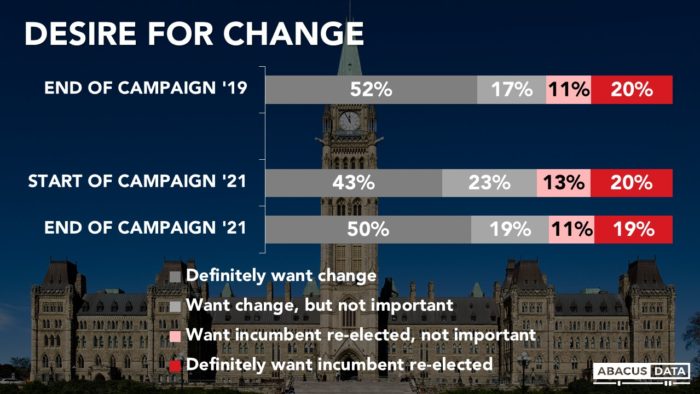
It seemed to me that Erin O’Toole traded in his image as a moderate conservative for a True Blue positioning to win the leadership, and then tried to reverse the trade in the election. Whether it worked will for some just be a question of whether he wins the election, but to my eyes, the Conservative Party today, even if it wins, will be an increasingly uncomfortable and fragile alliance of people whose values on diversity and inclusion, guns, right to life/choose, and the environment at a minimum are not aligned.
(Because I think only a moderate conservative party can win government in Canada, and because I prefer to have more than one choice I could vote for personally, I’m biased in that I want a Conservative Party that plays it closer to the centre of the spectrum, but that fight in the Conservative Party is far from settled, it might in fact be just getting ramped up.)
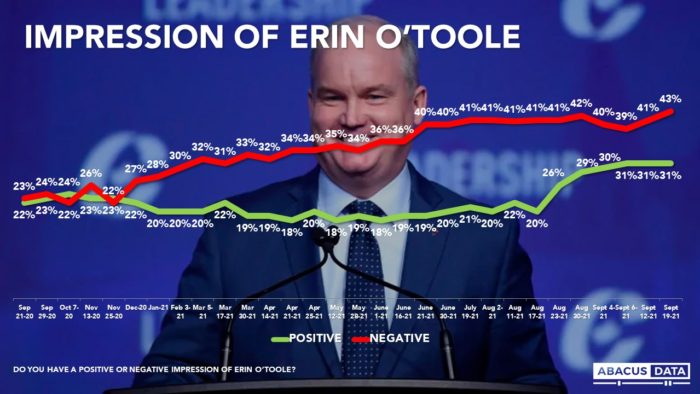
Different people have different takes on how much the Liberals calling an early election will cost them votes. My take is that it annoyed a lot of people and created some headwind against their messages in the first couple of weeks, but won’t be the thing that denies them a victory if in fact, they lose. Nor do I think it will be a deep dislike of Justin Trudeau. He’s certainly got scar tissue and a quarter of voters really don’t like him, but a quarter is not all that many for a 6-year incumbent and people can win with that level of voter animosity, no question about it. I think we also saw once again that when Justin Trudeau thinks he might lose a race, he finds another gear and he presents his case with different energy, reveals a level of knowledge of the issues that impresses, and is a much better campaigner.
If the Liberals lose it will come down to two factors:
First, their positioning and language in recent years left some centre-spectrum voters to feel the party was too far to the left for their tastes, more ideological than pragmatic, and needlessly mistrustful of business (the first major self-injury of this sort was the small business tax changes in the first Trudeau term).
Second, some progressive voters want more action more quickly and with fewer caveats on the issues that matter to them, such as income inequality, climate change, diversity and indigenous relations. The “Goldilocks” positioning in Canadian politics – not too much of this or that – is often a reliably winning formula but whether the Liberals wandered away from it, or whether in the era of social media platforms it no longer works – or both – is a question that will become clearer over time.
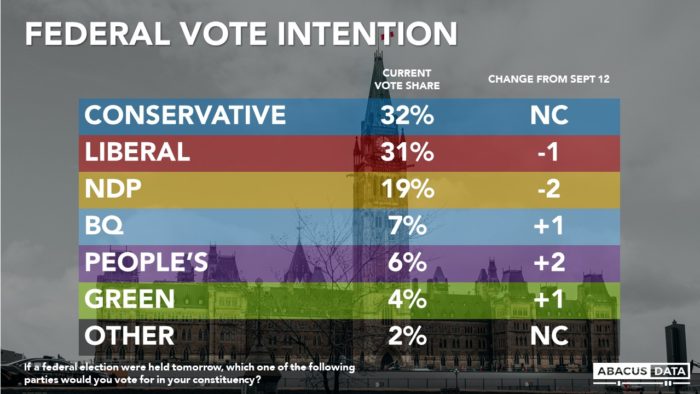
If the Liberals win, it will be because of two factors as well:
One, Erin O’Toole has run a campaign that seemed to put little effort into rallying different factions in his party who might have aligned with other leadership candidates, or perspectives. People like Peter Mackay, Lisa Raitt, Michael Chong, Rona Ambrose, James Moore. His front bench was invisible. He was neither fish nor fowl on vaccination – sure they were a good idea but unwilling to commit to having a caucus that was vaccinated. His fiscal plan looked so much like the Liberals that fiscal conservatives were probably rubbing their temples in frustration. He ceded a lot of opportunity to Max Bernier. For Bernier, it was probably a gift that he was left out of the debates because his party just started to look like a legitimate option fronted by purple lawn signs and less like a personal vendetta and a bunch of off-putting ideas. If the Liberals win, one significant factor will be the drain of votes from the Conservatives to the Peoples Party.
The other will be the size of the NDP vote. Jagmeet Singh is relatively popular and managed to get through the campaign without a great deal of stress testing. Some of his promises are unworkable from a jurisdictional standpoint, and his climate plan was found wanting by a large number of subject experts. His support level has been fairly steady, even if persistently soft in nature: NDP voters mostly don’t want a Conservative government and whether they vote Orange or Red will have a major effect on tonight’s outcome in my view.
As a final note, I’m lucky and happy to live in a democracy where we have choices, and where voters decide, and I’m interested in the nature of their decision. To be in this profession for almost 40 years is to be interested in the politics of our country, not only the science of measuring public opinion, at least for me. I try to provide a fair analysis of data and also express my opinion about events, and hope that people appreciate the value in the former, and understand the inevitability of the latter.
Click here to see Abacus Data’s final poll results of the 2021 campaign
ABOUT ABACUS DATA
We are the only research and strategy firm that helps organizations respond to the disruptive risks and opportunities in a world where demographics and technology are changing more quickly than ever.
We are an innovative, fast-growing public opinion and marketing research consultancy. We use the latest technology, sound science, and deep experience to generate top-flight research-based advice to our clients. We offer global research capacity with a strong focus on customer service, attention to detail and exceptional value.
We were one of the most accurate pollsters conducting research during the 2019 Canadian Election.
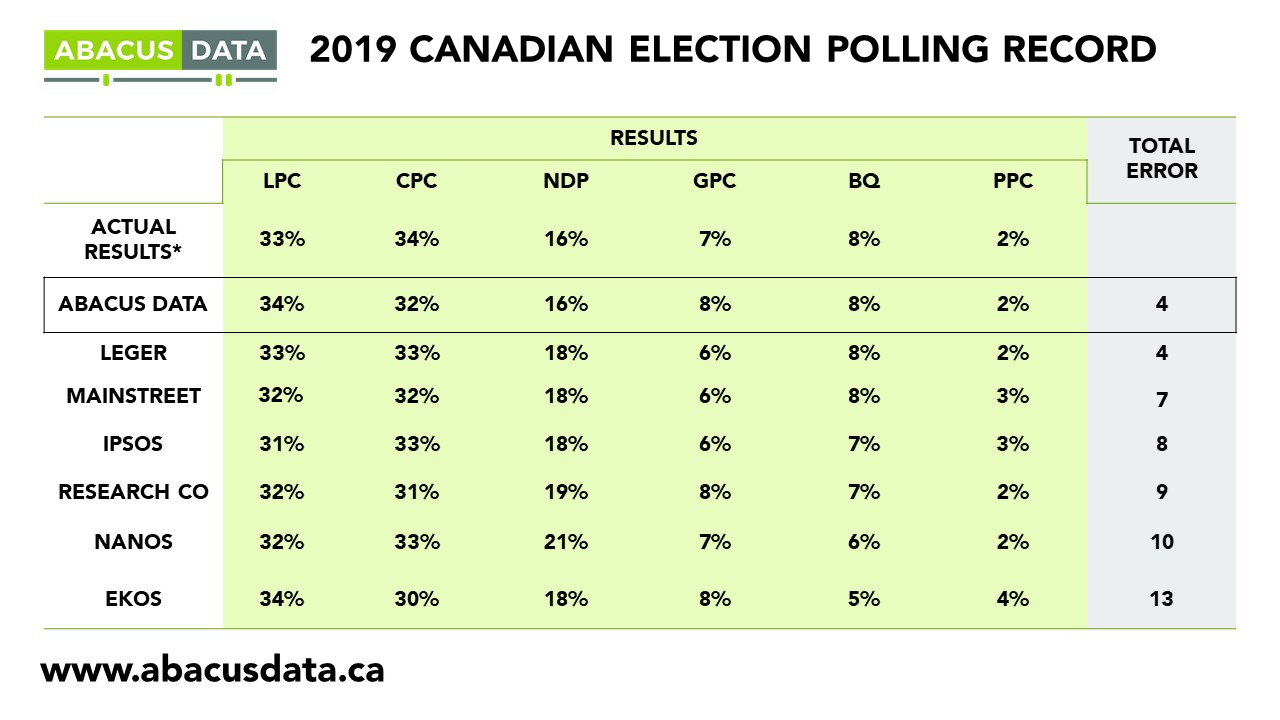
Contact us with any questions.
Find out more about how we can help your organization by downloading our corporate profile and service offering.

